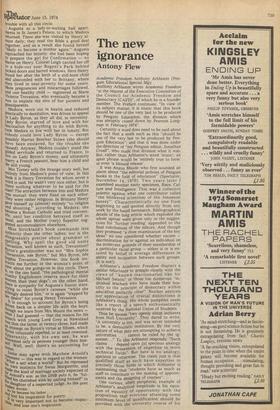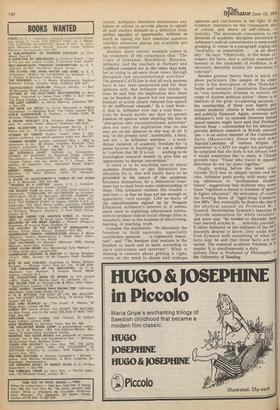The new ignorance
Antony Flew
Academic Freedom Anthony Arblaster (Penguin Educational Special 50p) Anthony Arblaster wrote Academic Freedom "at the request of the Executive Committee of
the Council for Academic Freedom and Democracy (CAFD)", of which he is a founder member. The Preface continues: "In view of its subject matter, it is ironic that this book should be one of the very last to be produced by Penguin Education, the division which was abruptly closed down by Pearson Longman in February 1974". Certainly a word does need to be said about the fact that a work such as this "should be one of the very last to be produced by Penguin Education"; and that it was done under the direction of "my Penguin editor, Jonathan Croall", who made that division what it was. But, rather than Arblaster's word 'ironic', an apter phrase would be 'entirely true to form' or even 'a blessed release'.
It was Angus Maude who first sounded an alarm about "the editorial policies of Penguin books in the field of education" (Spectator, November 14, 1970). Two years later I examined another nasty specimen, Race, Culture and Intelligence. That was a collective polemic against what one contributor called "the blinkered scientism of the Jensenist 'heresy". Characteristically no one from beginning to end quoted directly from any work by the hated heresiarch. Bibliographical details of the long article which exploded the whole uproar were given only in the suggestions for 'further reading' appended to the final conclusions of the editors. And though they promised "a close examination of the key ideas" no one considered whether racism — discrimination for or against an individual on the irrelevant grounds of their membership of a particular racial group — either is or is entailed by belief in average differences in ability and inclination between such groups. (It is not!) Arblaster's Academic Freedom displays a similar reluctance to grapple closely with the views of "known reactionaries like Sir Michael Swann" or those too numerous "individual teachers who have made their hostility to the principle of democracy within education perfectly clear". Neither analysis nor appreciation of crucial distinctions is Arblaster's thing. His whole pamphlet reads like a report of a speech enthusiastically received by the National Union of Students.
Thus he quotes "two openly elitist lecturers from Hull University". They dared to write: "A university is not, and was never intended to be, a democratic institution. By the very nature of what they are attempting to achieve
universities . cannot be ruled by the ignorant..." To this Arblaster responds: "Such claims . . depend upon [a] specious analogy with the possession of expertise in more technical fields". But here is no analogy, specious or otherwise. The claim just is that qualified staff as such have expertise in precisely those fields in which Arblaster is maintaining that "students have as much as staff to contribute to the making of appointments and the designing of courses".
One curious, albeit peripheral, example of
Arb of equality of ineptitude is his equa
tion of opportunity with the Proposition that everyone attaining some minimum level of qualification should be provided with the university course of his
choice. Arblaster therefore denounces any failure or refusal to provide places to satisfy all such student demand as a defection from perfect equality of opportunity, without so much as raising the here essential question whether whatever places are available are open to competition.
Another, more central, example comes in his treatment of the contention that "The crime of Atkinson, Blackburn, Bateson, Arblaster, and the teachers at Hornsey and Guildford consisted not in the views they held, but in trying to advance those views through disruption and unconstitutional activities". The general CAFD line is that all such persons have in fact been persecuted and for their opinions only. But Arblaster also thinks "it must be said that the implication that there can be freedom of speech but not necessarily freedom of action clearly reduced free speech to an ineffectual charade." In a cool hour— if, that is, Arblaster ever has a cool hour — even he would surely see that to permit freedom of opinion while drawing the line at "disruption and unconstitutional activities" does not carry the implication that no one may act on his opinions in any way at all. It was "in the present time", lamentably, a duty, and not — as Arblaster assumes — a scandalous violation of academic freedom for "a senior lecturer in Sociology" to ask a referee to "confirm that Mr X is not ... wishing to do sociological research merely to give him an opportunity to disrupt universities."
It there is to be anything special about academic freedom, or any distinctive justification for it, this will surely have to be grounded in the nature of the academic functions themselves. So a theoretical treatment has to start from some understanding of these. This Arblaster realises. His trouble — and ours — is that he does not see enough or, apparently, care enough. Like so many of the educationalists signed up by Penguin Education Arblaster's interest is, it seems, much more in exploiting educational institutions to produce radical social change (that is, socialism), than in the business of discovering, learning, or teaching, truth.
Consider his statements: "In education the freedom to hold opinions, especially unorthodox opinions . . . is supremely important"; and "The freedom that matters is the freedom to teach and to learn according to one's convictions and interests". What is missing is concern about getting it right; stress on the need to shape and reshape opinions and convictions in the light of the evidence; insistence on the consequent dutY of critical, and above all self-critical, ra.
tionality. The maximum concession to the demands of academic discipline permitted by Arblaster's radical commitments is memorablY grudging. It comes in a paragraph urging that "neutrality, or impartiality . . . is an absur.
dity". He says: "Objectivity, in the sense of a respect for facts, and a certain standard of honesty in the treatment of evidence, is an obviously desirable quality for education to cultivate".
Besides general theory there is much too about particulars. One sample of its objec
tivity is his description of Mrs Thatcher's feeble and tentative Consultative Document as "one systematic attempt to restrict the
scope of student political action": there is no mention of the great occasioning anomaly the membership of these now highly poll' ticised students' unions is both compulsorY and publicly financed. Again, someone with Arblaster's zeal to unmask interests behind stated reasons might have said that Professor Steven Rose — commended for his labours to prevent defence research in British universi. ties — is an active member of the Communise Party (Muscovite). Since he, and other Marxist-Leninists of various stripes, are prominent in CAFD we ought not perhaps to be surprised that the body is not always what it would sometimes like to seem. A Chinese proverb runs: "Those who travel in opposite directions do not lay plans together."
Finally, writing before the latest coun" trywide NUS ban on alleged racists and faa. cists, Arblaster pooh poohs, with many ranting references to "professional student' haters", suggestions that students may sometimes "represent a threat to freedom of speech in higher education". He welcomes, of course' the howling down of "right-wing Conservative MPs." But eventually he draws the line at the physical assault on Professor H. J. Eysenck. Nevertheless Eysenck's inquiries (1° "provide ammunition for white racialists and more may "be needed to discredit the than learned articles in ... minority journals . If either Arblaster or the militants of the NI-JS sincerely desired to know, they could learn from Eysenck both something of what the facts may be and that these facts are not racism. The essential academic freedom is t° inquire. It is simultaneously a duty. Antony Flew is Professor of Philosophy at the University of Reading.



































 Previous page
Previous page